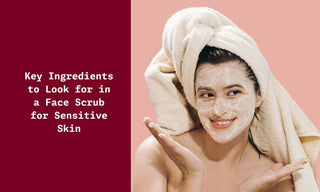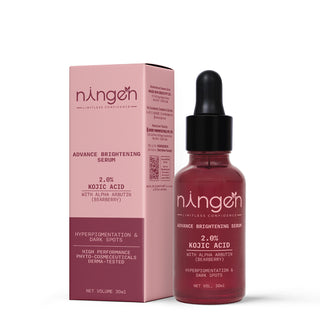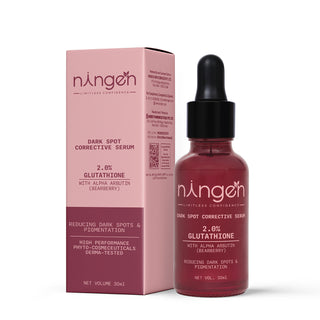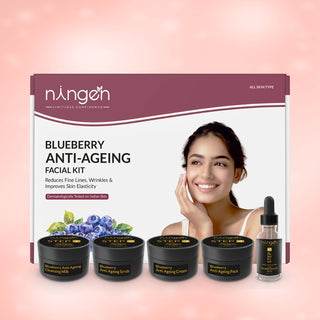Exfoliating can be quite tricky when you have sensitive skin. The wrong face scrub can leave your skin feeling irritated, red, and worse than before. But don’t worry; finding the right ingredients in a scrub can make all the difference. This guide will help you navigate the key ingredients to look for in a face scrub for sensitive skin, so you can gently remove dead skin cells without irritation, leaving your skin smooth, calm, and glowing—just the way you want it!
In This Article;
- Importance of Choosing the Right Face Scrub
- Types of Scrubs
- Key Ingredients to Look for in a Face Scrub for Sensitive Skin
- Ingredients to Avoid in Scrubs for Sensitive Skin
- Tips for Selecting a Face Scrub
- Wrapping Up
- Quick View
- Frequently Asked Questions
Importance of Choosing the Right Face Scrub
Choosing the right face scrub ingredients is essential for sensitive skin, as it helps remove dead cells and promotes a brighter complexion without irritation. Avoid scrubs with harsh chemicals; opt for gentle ingredients like rice powder, jojoba beads, and mandelic acid for mild exfoliation. Using physical exfoliants with a light touch or chemical exfoliants like mandelic acid can support cell turnover without damaging sensitive skin. Always maintain a balance—over-exfoliating can strip natural oils, leading to dryness and breakouts. The right scrub will effectively refresh your skin without compromising its natural barrier.
Types of Scrubs
There are various types of scrubs, each designed to address different skin concerns and preferences. Here’s a breakdown of the main types of scrubs:
1. Physical Scrubs
- Sugar Scrubs: Use sugar granules that dissolve as you massage them into the skin, offering gentle exfoliation. Suitable for most types of skin, but can be abrasive if overused.
- Salt Scrubs: Contain salt crystals for a coarser exfoliation, often used on the body rather than the face. Good for rough areas like elbows and knees but can be too harsh for sensitive skin.
- Rice Powder Scrubs: Utilize finely milled rice powder, providing gentle exfoliation ideal for sensitive skin types.
- Coffee Scrubs: Made with ground coffee, these scrubs help exfoliate dead skin cells and can stimulate blood flow, leaving skin smoother and more energized.
2. Cream Scrubs
- Cream-Based Scrubs: Combine a creamy base with gentle exfoliating beads, offering mild physical exfoliation while moisturizing the skin, making them suitable for dry and sensitive skin types.
3. Gel Scrubs
- Gel-Based Scrubs: Light, non-greasy scrubs often infused with small beads or natural exfoliants like jojoba beads. Ideal for oily and combination skin as they exfoliate without adding extra oil.
4. Clay Scrubs
- Clay-Based Scrubs: Use natural clays like kaolin or bentonite combined with exfoliating particles. They help in drawing out impurities and excessive oil while gently exfoliating, making them great for acne-prone or oily skin.
5. Enzyme Scrubs
- Fruit Enzyme Scrubs: They contain enzymes from fruits like pineapple or papaya that gently dissolve dead skin cells without physical scrubbing. Suitable for sensitive or mature skin.
6. Charcoal Scrubs
- Charcoal-Infused Scrubs: Combine charcoal with fine exfoliating particles to detoxify and cleanse the skin deeply while exfoliating. Best for oily as well as acne-prone skin types.
7. Microbead Scrubs (Banned in many countries due to environmental concerns)
- Contains tiny plastic beads for exfoliation. These scrubs are no longer recommended due to their harmful impact on marine life and have been replaced by biodegradable alternatives.
8. Herbal Scrubs
- Natural Ingredient Scrubs: Use crushed herbs, seeds, or botanicals for exfoliation, offering a gentle, natural way to buff away dead skin cells.
9. Exfoliating Powder Scrubs
- Dry powders activated with water or cleanser that provide a customizable level of exfoliation, often containing rice powder, oatmeal, or enzymes.
Also read: How to exfoliate your face?
Key Ingredients to Look for in a Face Scrub for Sensitive Skin
When choosing a face scrub for sensitive skin, it’s essential to focus on ingredients that provide gentle exfoliation without irritating. Here are the key ingredients to look for:
1. Jojoba Beads
- Why It’s Good: These smooth, rounded beads offer gentle exfoliation without causing micro-tears in the skin, making them perfect for sensitive skin types.
2. Oatmeal
- Why It’s Good: Oatmeal is soothing and helps calm irritation while gently sloughing away dead skin cells. Its anti-inflammatory characteristics make it ideal for people with sensitive or reactive skin.
3. Rice Powder
- Why It’s Good: Finely milled rice powder provides mild exfoliation, removing dead skin cells without irritating them. It’s gentle enough for daily use and helps brighten the complexion.
4. Aloe Vera
- Why It’s Good: Known for its soothing properties, aloe vera helps calm and hydrate the skin during exfoliation, reducing the risk of redness and irritation.
5. Chamomile Extract
- Why It’s Good: Chamomile's anti-inflammatory and calming properties make it perfect for soothing sensitive skin while gently exfoliating. It helps reduce redness and irritation, making it an excellent ingredient in face scrubs.
6. Cucumber Extract
- Why It’s Good: Cucumber is hydrating and calming, helping to soothe sensitive skin and reduce puffiness while providing a mild exfoliating effect.
7. Papaya Enzymes (Papain)
- Why It’s Good: Enzymes from papaya gently dissolve dead skin cells without the need for harsh scrubbing, making it ideal for sensitive skin that can’t tolerate physical exfoliation.
8. Willow Bark Extract (Natural BHA)
- Why It’s Good: A natural source of salicylic acid, willow bark provides gentle exfoliation, helping to clear pores without irritating sensitive skin.
9. Green Tea Extract
- Why It’s Good: Rich in antioxidants and anti-inflammatory properties, green tea helps soothe and protect sensitive skin from environmental stress while gently exfoliating.
10. Glycerin
- Why It’s Good: Glycerin is a humectant that keeps the skin hydrated during exfoliation, preventing dryness and irritation, which is especially important for sensitive skin.
11. Grapeseed powder
- Why It’s Good: Grapeseed powder, when used in scrubs, offers a mild exfoliating effect that helps remove dead skin cells without being too abrasive, making it suitable for sensitive skin types.
12. Apricot
- Why It’s Good: Apricot provides a gentle, non-abrasive exfoliation. Unlike harsher exfoliants, apricot kernels are smooth and rounded, minimizing the risk of micro-tears in the skin that can lead to irritation, making it suitable for sensitive skin types.
Also read: Are facial scrub safe for daily use?
Ingredients to Avoid in Face Scrubs for Sensitive Skin
When choosing a face scrub for sensitive skin, it's essential to avoid ingredients that can trigger irritation or breakouts. Opting for gentle, chemical-free, or organic formulations can significantly reduce the risk of aggravating sensitive skin. Here are some key ingredients to avoid:
-
Fragrances
Artificial fragrances are common irritants that can disrupt sensitive skin’s natural balance, causing redness and discomfort. Even natural scents like essential oils can be too harsh. Consider selecting "fragrance-free" products for minimizing irritation. -
Harsh Physical Exfoliants
Exfoliants like fruit pits, nut shells, or coarse granules can create micro-tears in sensitive skin, leading to inflammation. Instead, choose gentle exfoliants like finely milled rice powder or Jojoba Beads, and apply with gentle circular motions to protect the skin’s barrier.
Tips for Selecting a Face Scrub
When choosing a face scrub for sensitive skin, it's crucial to consider ingredients that cater to the delicate nature of your skin. Here are some useful tips to help you select the right product:
- Focus on Gentle Exfoliants: Look for products with gentle physical exfoliants like rice powder or biodegradable Jojoba Beads. These ingredients are less likely to irritate sensitive skin when used with circular motions.
- Hydroxy Acids: Opt for milder hydroxy acids such as lactic acid, mandelic acid, or polyhydroxy acids (PHAs) which provide gentle exfoliation without the harshness of glycolic and salicylic acids.
- Hydration is Key: Ingredients like Hyaluronic Acid help maintain moisture balance in the skin, crucial for sensitive types to prevent over-drying.
- Avoid Harsh Chemicals: Chemical free options with natural or organic ingredients can be better suited for sensitive skin types, as they minimize the potential for irritation.
Wrapping Up
Finding the right face scrub for sensitive skin can be transformative, helping you achieve a glowing, smooth complexion without irritation. By choosing scrubs with gentle, skin-friendly ingredients like jojoba beads, rice powder, and soothing extracts, you can safely exfoliate while protecting your delicate skin barrier. Avoiding harsh chemicals and understanding the importance of hydrating ingredients will ensure your skin remains calm, healthy, and radiant. Always listen to your skin’s needs and adjust your exfoliation routine accordingly for the best results.
Quick View
Exfoliating sensitive skin requires choosing gentle, chemical-free face scrubs with soothing ingredients like jojoba beads, rice powder, and chamomile extract. Avoid harsh physical exfoliants and fragrances that can irritate. Opt for mild hydroxy acids like mandelic acid and keep skin hydrated with ingredients like glycerin to maintain a healthy, radiant complexion.
Frequently Asked Questions
Q1. What is the best type of exfoliant for sensitive skin?
Gentle physical exfoliants like jojoba beads or rice powder, and mild chemical exfoliants like mandelic acid, are best suited for sensitive skin.
Q2. Why should I avoid scrubs with fragrances?
Fragrances, both artificial and natural, can irritate sensitive skin, causing redness and discomfort. It's best to choose fragrance-free products.
Q3. Can I use a face scrub if I have acne-prone sensitive skin?
Yes, opt for gentle scrubs with calming ingredients like green tea or willow bark extract to exfoliate without aggravating acne or sensitivity.
Q4. How often should I exfoliate sensitive skin?
For sensitive skin, exfoliating 1-2 times a week is usually sufficient to avoid over-exfoliation and maintain the skin's natural barrier.
Q5. What ingredients should I look for in a scrub for sensitive skin?
Key ingredients include jojoba beads, oatmeal, rice powder, aloe vera, chamomile extract, and papaya enzymes, which provide gentle exfoliation.
Q6. Why are scrubs with nut shells or fruit pits bad for sensitive skin?
These coarse exfoliants can cause micro-tears and irritation, making them too harsh for sensitive skin types.
Q7. Is it safe to use enzyme scrubs on sensitive skin?
Yes, enzyme scrubs with ingredients like papaya or pineapple enzymes are gentle and effective, providing exfoliation without the need for physical scrubbing.
Q8. Can I combine physical and chemical exfoliants on sensitive skin?
While possible, it's essential to do so cautiously. Use products that combine mild forms of both, like mandelic acid with jojoba beads, and limit usage to avoid irritation.
Q9. What should I do if my skin feels dry after using a face scrub?
Follow up with a hydrating serum or moisturizer containing ingredients like hyaluronic acid or glycerin to restore moisture balance.











